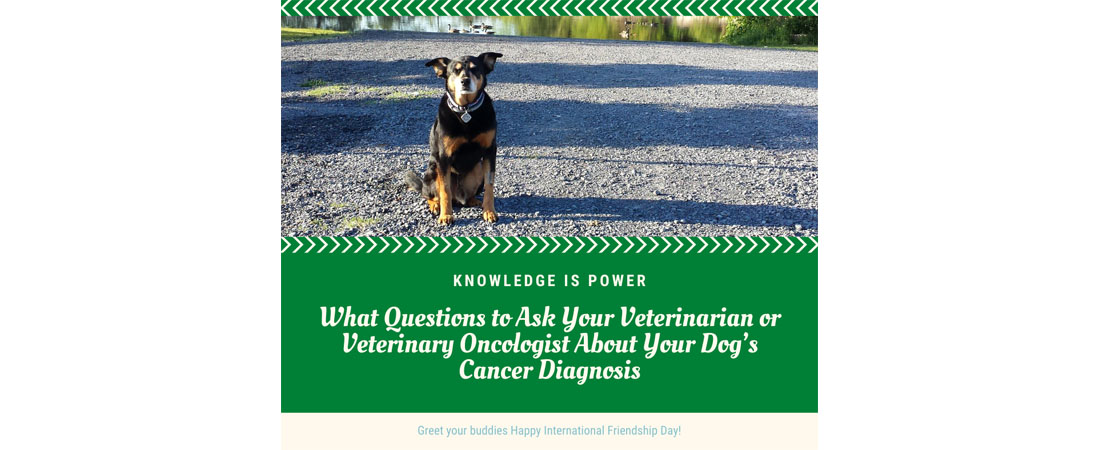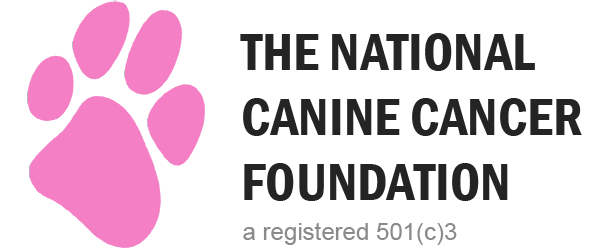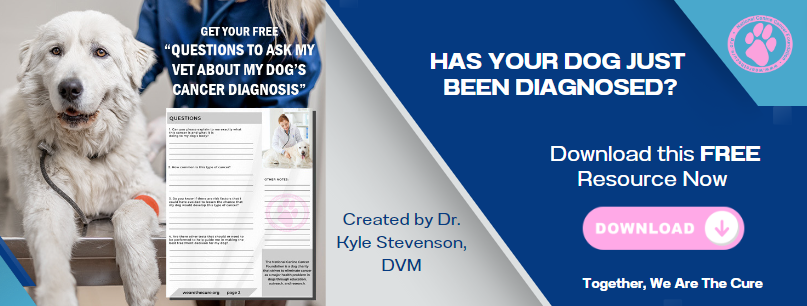
Information about our dog’s particular diagnosis may come from many sources: our veterinarian, our veterinary oncologist, books, journal articles, and websites, to name a few. The sheer volume of available information may actually be too overwhelming for us.
Knowledge Through the Cancer Journey
It seems as though our brains, at first, cannot bear to comprehend the diagnosis of cancer, and, then, cannot consume nearly enough information about it. However, when researching more information about our dog’s particular type of cancer, we may then become overwhelmed.
While having knowledge about your dog’s type of cancer is extremely important in guiding your decision-making process on how to go about treating your dog, it also can feel lonely and crippling. All of that information may leave you with more and more questions and fewer and fewer answers.
When you are feeling overwhelmed, it is possibly best to schedule a follow-up appointment – either via phone or in-person – with your dog’s veterinarian or, even better, a veterinary oncologist. While your regular veterinarian may feel fairly comfortable discussing the ins and outs of your dog’s cancer with you, keep in mind that a veterinary oncologist has had at least three additional years of training to specialize exclusively in cancer care. He or she will be up-to-date on any recent treatment advancements for your dog’s type of cancer.
Once you have made this follow-up appointment, it is important to take some time to create a list of specific questions to ask your regular veterinarian or veterinary oncologist. Unfortunately, these veterinary professionals do not have an infinite amount of time to spend with each and every client, so it is important to make the most of this appointment so that as many of your questions get answered as possible and so that you can make the best decision possible with regards to treating your dog.
This aforementioned list of questions will not likely be the same for everyone. We all have different backgrounds with regards to our ability to understand specific scientific information. We all have different experiences, as well. Some of us have been down this road before with either the same dog or a different dog or know a family member or friend whose dog had cancer. Some of us are experiencing canine cancer for the first time. No two dogs react the same exact way to their cancer, either. Variations seem to abound everywhere.
Questions to Ask Your Veterinarian:
However, there are some common questions that can and should be addressed at these follow-up appointments that will assist you in making the best decision possible for your dog with regards to treatment. (below you can download a copy of the questions to take with you to the appointment)
- Can you please explain to me exactly what this cancer is and what it is doing to my dog’s body?
- How common is this type of cancer? Do you know if there are risk factors that I could have avoided to lessen the chance that my dog would develop this type of cancer?
- Are there other tests that should or need to be performed to help guide me in making the best treatment decision for my dog?
- If so, what are the average costs of these additional tests?
- Which tests are the most important ones to perform?
- Can some of these tests be skipped and, if so, how will that affect the decision-making process?
- If so, what are the average costs of these additional tests?
- What are the treatment options that are available for my dog?
- What are the associated costs for each type of treatment?
- How often does my dog have to be treated?
- Do you perform the treatments at your clinic?
- If so, is it on an out-patient basis, or will my dog need to be hospitalized?
- Do I have to be referred elsewhere for these treatments?
- Will my dog have to be treated for the rest of his/her life?
- Do you perform the treatments at your clinic?
- What is my dog’s prognosis for each type of treatment available?
- Is it possible that my dog can be cured?
- What are the common side effects that you see with treating this particular kind of cancer?
- Are side effects common?
- If my dog gets sick from treatment, who should I call if you are not available?
- Is my dog well enough to withstand treatment?
- Are there any alternative options to traditional veterinary medicine for treating my dog’s cancer, such as supplements, herbs, or food?
- Could any of these be used in addition to the treatment options that you are recommending?
- Are there any current clinical trials that my dog could potentially participate in?
- What could I expect to happen if I decide not to have my dog treated?
- Are there any support groups about this type of cancer available – either in-person or online – that I could join to help me get through this difficult and emotional time?
Answers to these questions may or may not be difficult for you to digest. If your dog is facing an aggressive form of cancer, these answers may leave you feeling somewhat defeated. However, finding the answers to these important questions will assist you in making the best decision possible for not only your best buddy but also for you. The most important pieces of information at the end of the day are the ones that allow both your best buddy and you to maintain a good quality of life while you are dealing with cancer.
By Dr. Kyle Stevenson of Paws4Potter



Recent Comments